Updated 16/11/2023
Many cat carers have experienced this - you’re at home, relaxing with your favorite feline, and you look over at them and notice your cat squinting or squinting with one eye. What’s happening? Well, we’re here to answer that today!
The information below will help to calm concerned cat parents, as well as offer advice on what could be causing your cat’s squinting eyes. Cats display many weird behaviors which can make them more difficult to understand than dogs. But fret not, as always, we’re here to help!
Trending posts
Purr-use some of the top blogs our members have been loving this month- Top male dog names for your new furry friendGot a new furry family member in your pack? Check…

- Top female dog names for your new fluffy palWelcoming a new pooch into your family? Explore…

- 250+ gray cat names your silver feline will loveRecently welcomed a fluffy gray bundle of joy into…

- What are normal pet sitting rates?Discover the average pet sitting rates for animals…

- Unique dog names to stand out from the packDare to be different with our list of the best…

Reasons why your cat’s squinting
The answer to why do cats squint can be placed in one of two categories - medical condition or communication. For medical conditions, we’ve listed some of the most common eye problems for cats, however, do not use this as a way to diagnose your kitty. Always seek vet advice or help if you’re concerned.
Conjunctivitis, Feline Herpesvirus, and Corneal Ulcers
Conjunctivitis is the most common of all feline eye problems. The ‘conjunctiva’ is a mucous membrane that covers the outer edge of the eye and the inside of the eyelids. When they become infected, most commonly through a virus, symptoms include swollen and red eyes, coughing, sneezing, or a runny nose, signs of discharge around their eyes, and squinting.
Conjunctivitis can be caused by a range of different viruses that enter the eyes through a scratch, cut, or damage from an outside object. However, the usual cause for conjunctivitis is feline herpesvirus. This is a common respiratory disease that can be very uncomfortable for cats. Your vet can help manage these symptoms with appropriate medical treatment such as eye drops, although sadly long term cure is unlikely and relapses are common.
Corneal ulcers (physical damage to the surface of the eye) can form through infection and viruses, like conjunctivitis. It may also be seen with trauma. Extra symptoms include cloudy, watery eyes, as well if they are squinting more with one eye than another. Ulcers are usually very painful.
Allergies
Just like us humans, kitties can be allergic to foods and spores in the air. They will display similar symptoms - swollen eyes, running nose, leaky fluid from their eyes, sneezing - as well as cat squinting. Your vet will be able to do some blood tests and will ask you questions about whether anything has changed with your fur baby's diet, routine, or where they’ve spent time outside (if they’re not an indoor kitty).
Glaucoma
Feline glaucoma is a very serious condition, particularly if left untreated for a long period. Very sadly, if a kitty is diagnosed with this disease it will likely suffer permanent eye damage and blindness. Symptoms include dilated pupils, pawing at the eyes, cat squinting, and discoloration in one or both eyes. Contact your vet immediately if your feline friend is showing any of these symptoms.
Communication
What does it mean when a cat is squinting at you? Is it a sign of love? Yes, it is! Recognizing how purr-babies communicate could make you realize how much they care for you. If you’ve ever caught your cat looking at you with their eyes half closed or slowly blinking at you, guess what, they’re saying they love you!
Staring with wide eyes is a sign of concern, so squinting is a comforting sign, showing there is no cause for alarm.
Of course, be sure they’re not displaying any other symptoms mentioned above. If they’re all clear, you can even slowly blink or cat squint back at them as a way of responding. Trust us, they’ll know what you mean!
Recommended reading: Understanding your cat's gaze: why does my cat stare at me?
Meet our veterinary expert, Greg
This article has been checked by veterinarian Dr Greg Steele MA VETMB MRCVS. A mixed vet working in the UK since qualifying from Cambridge University in 2015. Greg enjoys working with all species of animals in all settings, but equally takes pride in communication and education of clients too. He lives with his wife and their cat, and enjoys a variety of sports, gardening, and the great outdoors.
When to be concerned about your cat’s eyes
You must never attempt to self-diagnose your cat. If you’re ever concerned about your cat’s eyes or general well-being, always contact a vet as soon as possible.
For those who are already TrustedHousesitters members, you can contact our 24/7 Vet Advice Line if you’ve noticed any of the concerning symptoms included above.

